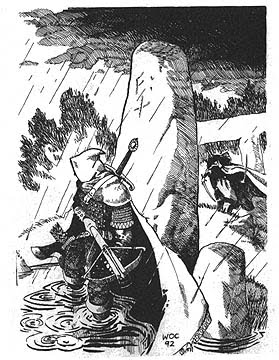

Long time player of ArM5 here, with my recollections: 3rd edition to 4th The largest differences are those not listed on page 262 of ArM4 Core. The publisher changed from White wolf to Atlas and therefore the fundamental assumptions behind the game changed. Mechanical The largest change, in my opinion is that ArM4 has 'spell boosting' where you can burn vis for an extremely non-trivial range, duration, or target increase. This changes the balance of power of magi in mythic europe. Setting In ArM3, due to a desire to be with other white wolf products, there's True Reason as an Aura and virtue that's pretty silly. Basically it's taking enlightenment concepts and trying to push them back in time.
Review of Ars Magica Fourth Edition. I haven't played the game since White Wolf's 3rd edition of Ars was new (something like ten or eleven years ago). Ars Magica 4th Edition Core Rulebook Come to a land of adventure and mystery, of falling empires and rising nations, of legendary creatures and incredible myths. While I like my Ars database and am fairly happy with the character sheets it prints out, its sheets. Ars Magica Third Edition Character Sheet. Welcome to Ars Magica, and to the world of Mythic Europe. It is a place where the glories of the Classical world are dust and the promise of the Renaissance is yet to.
House Guernicus is known as Quaesator, due to their most common role. Virtues and flaws have a different balance. There's a link between Tremere in ArM and Tremere in WoD. Confidence operates as reroll instead of bonus. I'm sure there are other, subtle, differences, but the largest are in the feel of the setting. The difference in publishers makes a significant change to the tone of the game.
--- Massive Edit --- 4th to 5th The differences from 4th to 5th are, as the core book says on 223, 'Nothing has changed. Everything has changed' And it's completely correct. The setting changes from 3rd to 4th are mostly gone, though with a few humorous notes: 'The Tremere had a problem with vampires. They fixed it.
It's not interesting now.' Which is riffing on the white wolf stuff. Setting Functionally speaking, there are no setting changes that I can tell, and I'm quite familiar with 4th and 5th. While it's possible to use setting books from any edition due to the. Rough familiarity of editions, setting books from 3rd and below require 'interpretation' that books and adventures from 4th don't. Adventures from 4th are almost wholly compatible, due to the whole 'monsters have built-in powers' things. When adapting adventures, power down the opposition, but they can be run from the books as-is.
3d Ultra Lionel Traintown Deluxe For The Pc Download. The largest change in setting comes from the supplements (Art and Academe is a must buy for anyone interested in that time period. City and Guild is a horrible supplement.) There is a much lower focus on 'magic' in the world and more focus on the world qua itself. This complements the absence of vis-boosting which means magi cannot trivially take out mundane armies, especially with Realms of Power: The Divine in play. The world as presented is open to significant amounts of interpretation, just like in earlier editions, which suggests the ability to dial for whatever game you want to play. (My current game is mostly focused on resource management and survival in a hostile political atmosphere, and I'm happy to share how I figured out highly-granular accounting schemes for the covenant in a different post if poeple are interested.) Mechanics One of the more striking 'everything changed' aspects is in virtues. The point system (thankfully) was abolished and virtues consolidated into major and minor. With the exception of Beserk (minor virtue, should be major flaw in how it works out in game play) there are no 'trapped' virtues or flaws like previous editions sported.
Spell Guidelines have been rationalized and consolidated very well, tough the ranges, durations, and targets have changed slightly (for the better.) There are fewer ones, but spells are roughly at the same power level. Vis is far far less useful in spellcasting and rituals generate long-term fatigue, so they are profoundly not spammable. The changes guide is an excellent reference due to the lack of setting changes. One of the larger mechanical changes that will impact how players think about the game is confidence. In 4th ed, if you had enough confidence, you could spend it all on every roll and, barring a botch, always succeed and get it back. In 5th, confidence is split into Confidence Score and confidence points (and roughly each realm has an [Hierarchy (Infernal),True Faith(Divine),Fable(Faerie)) score to reflect increasing affiliation with that realm. The magic realm doesn't have a unique one, which reflects the centrality of the core book.
Players earn confidence points by role playing and can spend them (as the rules are written) on any stress die roll that happens for a specific event. I run with the house rule that confidence can be spent on anything, which significantly ramps up the rate of power increase. Combat is lethal, but sane. The rules reward armor and big weapons.